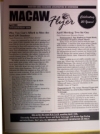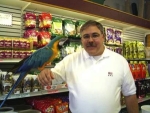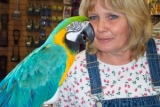![]()

September, 2003
The President's Perch
Steve Fitzsimmons, 2003 MACAW President
 Hello
and welcome to the September issue of the MACAW Flyer. This summer just flew by
didn’t it? Where did it go? Before summer gets completely away from us, we
will be having our MACAW picnic. The picnic will be on Sunday, September 14th
in the picnic grounds by the Henry Vilas Zoo from about 11:30am to maybe 4pm or
when the food runs out. Just look for the big birds hanging from the trees. If
you plan on joining us, please bring a dish to pass. At the time of this
writing, we are not planning on doing any grilling. I hope to see everyone come
out and get together. Not only will this be an opportunity to meet in the
outdoors for a good meal with good company, but it will be an opportunity to
tour the new aviary with other members and share our knowledge with one another.
This is a rare opportunity for us.
Hello
and welcome to the September issue of the MACAW Flyer. This summer just flew by
didn’t it? Where did it go? Before summer gets completely away from us, we
will be having our MACAW picnic. The picnic will be on Sunday, September 14th
in the picnic grounds by the Henry Vilas Zoo from about 11:30am to maybe 4pm or
when the food runs out. Just look for the big birds hanging from the trees. If
you plan on joining us, please bring a dish to pass. At the time of this
writing, we are not planning on doing any grilling. I hope to see everyone come
out and get together. Not only will this be an opportunity to meet in the
outdoors for a good meal with good company, but it will be an opportunity to
tour the new aviary with other members and share our knowledge with one another.
This is a rare opportunity for us.
We have some great events planned for the remainder of the year that I am excited to tell you about and we also have some catching up to do. So if you are ready, let’s begin.
This summer started out with a bang with a lot of rough weather, tornado warnings and heavy storms, but it slowly became a dry summer with a lot of nice weather days. The West Nile Virus made the news in Madison on August 1st, but quickly faded because of the lack of rain. West Nile is in Madison, but thankfully not a problem as yet. Things can quickly change so it is still recommended to keep birds indoors to reduce the threat from West Nile, a virus that can be fatal to our birds. The gypsy moths returned with a vengeance and they are something to see. This is one moth nearly as big and colorful as our birds, except a little too destructive. The movie "Winged Migration" played at the Hilldale Theatre over summer. This was an inspiring film that discussed the migration patterns of many birds, including macaws. Some birds fly from the north pole all the way to the south pole every year. In the newspapers there was an article about pet store prices being wrong at many area pet stores, and alerting you to watch the prices you are charged at the register. There is more on this later in this newsletter. Then there was a story off the MSNBC website that said scientists discovered pets have emotions. That was a story we could have written many years ago ourselves. We also had some events over summer, such as the Art Fair downtown where Clarence could be found selling sculptures of owls, Fine Feathered Friends annual carnival where Sandi hung out with clowns and news station anchors and the grand opening of the new aviary at the Henry Vilas Zoo. Clearly a lot was going on this summer. I hope everyone had a great summer.
Our upcoming events are just as exciting. For starters, MACAW will hold a club picnic on Sunday, September 14th as mentioned earlier. For our October meeting, we have a rare opportunity and special guest, Mr. Jim Hubing, the Zoo Director at the Henry Vilas Zoo who will talk to members about the zoo, interesting things about the new aviary, bird ambassador opportunities and take your questions. Paula our Education Director has written more about our upcoming educational meetings later in this newsletter. Other events on the horizon include Animart’s Pet Fest on September 6th, which MACAW will be represented at. Starting on September 16th and running through the 30th Fine Feathered Friends will be holding an online auction to help raise funds for their avian rescue. Some very nice items are available for bidding at http://www.feathered-friends.com/fundraiser.htm/. Another upcoming event for MACAW is having our own MACAW TV program on WYOU TV. Several members are already in the process of being trained to operate cameras and equipment. If you have an idea for a future show or would like to be a part of this exciting opportunity, please email me or see me at a meeting.
If you have access to the internet, our MACAW web site offers you many opportunities. You may notice that our web site has a few changes and some new features. It still gives you breaking news and it is the place where you can participate in forums. It also offers a MACAW slide show, a members mart, a place where you can read past newsletters, see upcoming events, see birds available for adoption and still much more. It is the place to learn more about what MACAW is doing, how to get involved, what opportunities exist and it is a place you can go 24 hours a day, 7 days a week to share experiences, ask questions or just hang out. Our website address is http://macaw.axisdata.com/.
Do you have an idea for MACAW? How would you like to become more involved in club decisions? Opportunities exist for interested members to join the board. You are also welcome to sit in on board meetings. It is your club. For the new members, please make yourselves comfortable and make a point to meet with me or another board member so we can introduce you to other members. It may be frustrating at first to know who is who, that’s where I can help you. We have a great club with many helpful members with many years of combined experience. Take advantage of the many opportunities available to you through MACAW including 10% discounts at MADCAT Pet Supplies and Animart.
Thank you.
Sincerely,
Steve Fitzsimmons
MACAW President
Stevenf@charter.net
In The Spotlight
 One year
ago, a customer who loved birds visited one of our area pet stores. This
customer saw a cockatoo being housed in terrible living conditions, receiving
little care, fearing for its survival. Her heart was so touched by the love she
felt for this bird, that she bought him, with no concern for the cost. She took
the bird home where she could assure its survival, shower it with love, and
offer it a good life. That customer was Sandi Meinholz, and that cockatoo was
Gilda. The experience with this one bird and pet store sent a shock wave through
her like a religious calling. This led her and her husband Randy to start Fine
Feathered Friends Avian Rescue and Sanctuary.
One year
ago, a customer who loved birds visited one of our area pet stores. This
customer saw a cockatoo being housed in terrible living conditions, receiving
little care, fearing for its survival. Her heart was so touched by the love she
felt for this bird, that she bought him, with no concern for the cost. She took
the bird home where she could assure its survival, shower it with love, and
offer it a good life. That customer was Sandi Meinholz, and that cockatoo was
Gilda. The experience with this one bird and pet store sent a shock wave through
her like a religious calling. This led her and her husband Randy to start Fine
Feathered Friends Avian Rescue and Sanctuary.
Fine Feathered Friends Avian Rescue and Sanctuary is this month’s "In The Spotlight" article. Since opening its doors to the avian community here in Madison one year ago, they have taken in 275 birds and have adopted out 193 birds. Sandi and her husband Randy run the rescue 24 hours a day with a team of big-hearted volunteers. Sandi says they cannot turn any bird away. Which is not easy to do when you continually take in more birds than you can adopt out.
This is why she is looking to expand into a larger building, so she can continue to take in and help more homeless birds. Raising the $250,000 she needs for this new building is no small task for a rescue just a year old. Add to this the veterinary bills to care for the sick or injured birds she receives, combined with the costs of just running the avian rescue, and it’s easy to see how challenging this is.
Throughout this however, she maintains incredible strength, determination and a positive spirit, from knowing that what she is doing is making a difference in so many birds’ lives. She also knows that she has no choice but to be there on the front lines, rehabilitating and rescuing these birds, and to work with the community to find new homes for them.
It is clear that the Madison area needed an avian rescue. For Fine Feathered Friends to take in close to 300 birds in the Madison area alone -- from the many large blue and gold macaws and cockatoos, to the small finches and canaries -- in just one year, is an incredible feat.
It is a sad reality that so many people who buy birds today, are poorly educated and unprepared for the responsibility of caring for such a magnificent animal for the rest of its life. So many sad stories can be heard at this rescue. Too many birds come to her after living in numerous homes in the birds’ first five years. Many of these birds can live to over 100 years. Some of these birds may be victims of abuse, neglect and poor treatment. Birds that are endangered because the rain forests are disappearing. Birds that have done nothing wrong other than to be the birds that they are. Birds are unlike dogs and cats. They are still considered wild, can live many years longer, and they can be more challenging. But they also can be more rewarding.
Unlike Sandi and Randy’s rescue, many pet stores will sell a bird to just about anyone with a credit card. Many won’t ask you the questions about your suitability as a bird caretaker, for fear of losing a sale. Sometimes the customer wants a bird for the wrong reasons, such as using it as a room decoration. Many birds that don’t live up to a customer’s expectation, end up neglected, abused or euthanized. The lucky few who make it to Fine Feathered Friends are given a second chance for a better life. Sandi and Randy make the effort to match people looking for birds with the right bird. They are not afraid to turn someone away if they feel someone is not qualified to care for the bird. Instead, they require potential adopters to fill out an application. They ask the tough questions, such as "What do you know about the needs of the bird?" or "What does your landlord, neighbor or roommate think of a bird that might scream louder than a smoke detector?". They are also there to educate, coach and assist the new adoptive parents when questions or behavior problems arise.
Fine Feathered Friends Avian Rescue and Sanctuary is a true friend to all birds most in need. They have a tough job that will only grow more demanding over time. If you would like to help this organization, please visit their web site at http://www.feathered-friends.com, and look at their upcoming online auction that runs from September 15th through the 30th, or offer them other forms of help. I am sure they would appreciate it. Happy Birthday Fine Feathered Friends, and may you have many more years of helping our avian community.
In The Spotlight is a monthly article devoted to MACAW members. The purpose is to introduce members to one another. Sandi and Randy joined MACAW about the same time Fine Feathered Friends opened, one year ago. Sandi also sits on our club’s Board of Directors and writes articles for the MACAW Flyer. If you would like more information on Fine Feathered Friends or would like to be considered for a future article, please email me at stevenf@charter.net.
Watch Those Prices!
Steve Fitzsimmons, 2003 MACAW President
Adopting a Second Home Bird
Sandi Meinholz, MACAW Board Member
Fine Feathered Friends - Adorable Adoptables
Sandi Meinholz, MACAW Board Member
www.feathered-friends.com
608 274-2615
Many Cockatiels
Males & females
Sun
Conure
Male, very nice bird, can be loud.
For more information on the above birds or to get an adoption application,
please visit our website at
www.feathered-friends.com
or call us at 608 274-2615.
The Pet Network Avian Placement List
Christene Crubaugh, MACAW Editor
For more information on any of the birds listed below please send an
e-mail to
petnetwk1@aol.com or call (414) 464-8808.
Dane County Humane Society Corner
Sandi Meinholz, MACAW Board Member
Please contact Jane Hanson with questions about
bird adoptions at 608-838-0413, extension 101.
There are more adoptable birds at
LaCrosse Avian Rescue, Rehabilitation and Adoption
608-452-2732, Email:
wingedjewels@aol.com
2003 Busy Bird Fairs
First Sunday in month
October 5, November 2, December 7
VFW Hall , 301 Cottage Grove Rd. , Madison, WI
10 am -3 pm, $2.00 Admission
Sheila at 608-362-4696 / email
BusyBirdToys@aol.com
http://www.birdhobbyist.com/busybirdtoys/htm/show_madison.htm
Please stop by the MACAW table and say hello to Kathy and other members
staffing the table!
MACAW Picnic Update
Steve Fitzsimmons, 2003 MACAW President
Lessons of the Geese
Steve Fitzsimmons, MACAW President
M.A.C.A.W. Education Calendar
Paula Fitzsimmons, MACAW Education Director
September 14th - MACAW Picnic in the picnic grounds by the Henry Vilas Zoo
11:30am to 4pm
October 12th - Mr. Jim Hubing, Zoo Director of Henry Vilas Zoo will talk about
the zoo, new aviary and bird ambassador positions.
Are there any topics you'd like to see covered, or places you'd like our group to visit? Here's some of my ideas for topics. Please contact me if you know of someone who can speak on any of the following:
* First aid for birds
* Behavior: What is "normal" and how to correct negative behaviors
* Finches and softbills: The "forgotten" birds
* How to ensure your bird is getting adequate exercise
* Is your bird a dinosaur? A look at the evolution of birds
* How to protect birds (companion and wild) through legislation and
advocacy
* Update on avian diseases and cutting-edge treatments
* Proper nutrition and what's in the foods you give your birds (I'd
like to schedule an avian nutritionist for this one)
* Planned
Parenthood: What are the options for preventing unwanted bird births?
* The similarities and differences between companion birds and
their wild counterparts
Each month the schedule is as follows:
- Board meeting starts at 1:00. All MACAW
members are welcome to attend board meetings.
-
Hospitality break is at 2:00 pm.
- Speaker is at 2:30 pm.
- M.A.C.A.W. meetings are held the second Sunday of the month
(excluding June, July, & August).
Meeting Location:
Midvale Community Lutheran Church
4329 Tokay Blvd., Madison, WI
Rooms 221-223 (second floor)
The meeting location is accessible by the Madison Metro bus system as well as
handicapped accessible.
Upcoming Community Events & Dates
Steve Fitzsimmons, 2003 MACAW President
Birdie Bread
From the Internet
2 boxes corn bread mix
2/3 c. milk
3 eggs
1 jr. size jar sweet potato or carrots
1/2 c. frozen peas
1/2 c. seed (optional)
1/2 c. pellets
Mix all ingredients together. Bake in muffin tins or 13x9 cake pan. Bake at 350 degrees for 30 minutes.
Reminders
Here are some helpful tips and reminders.
1: Our two web sites are http://macaw.axisdata.com/ (main site), and our web site at Madison.com is http://www.madison.com/communities/macaw/index.php.
2: Buying your bird supplies from MADCAT Pet Supplies or Animart helps save you money through member discounts.
3: Sandi will help you clean your bird cages (donations appreciated)!
If you think that jobs involving animals are limited, you will be pleased to learn of at least 105 different paths you can take. 105 Careers for Animal Lovers is a 39 page booklet listing 105 career ideas including resources and tips to help the reader zero in and help jump start that career search. www.pjpublications.com
MADCAT Inc.
Pet Supply Retailers
7820 Mineral Point Rd
Madison, WI 53717
608-833-5800
MACAW Members receive 10% discount on all bird supply purchases!
Feathered Fid's Bird Boarding
Jackie Hugo
Reasonable Rates
Health Exams Required
Including Blood Work
MACAW Members 10% Discount
Fine Feathered Friends Sanctuary, Inc.
Sandi Meinholz

We will bird sit for you in your home or ours.
We are a 501©3 non-profit exotic bird rescue and will care for your
bird/birds in your home or ours. All proceeds go directly back to the birds in
the sanctuary. For more information please call (608)274-2615 or Email: smeinie@charter.net.
Web
Site: www.feathered-friends.com.
| Welcome | | | Contacts | | | Meetings & Events | | | Pet Bird Seminar | | | Flyer | | | Join Us! | | | Avian Resources | | | Home |